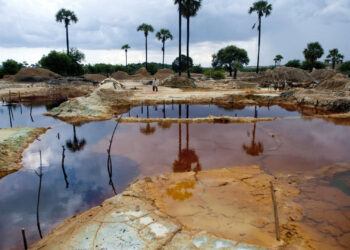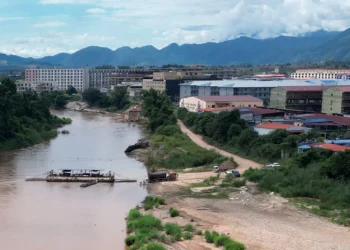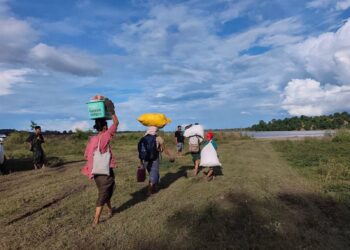By THE IRRAWADDY 27 May 2021
A motorcycle mechanic in Sagaing’s Kale was arrested by junta forces on Monday.
The next day his family was told to come and collect his body.
Ko Min Min, 39, who ran a motorbike workshop in Myotha ward in Kale, had not taken part in any anti-regime protest or armed resistance movement, said family members.
After a bomb exploded at No. 6 Basic Education High School in Kale on Sunday, soldiers and police came to his motorbike workshop on Monday.
“They said they would take him for interrogation for a while and release him later. But they didn’t take him to the police station. [Instead they took him] to Kale Regional Operations Command,” said a relative of Ko Min Min.
Ko Min Min and his two children. (Supplied)
The father of the two was taken away about noon and was still able to telephone his wife about 8 p.m. that day. He said he was OK and being interrogated on suspicion of being connected to the bomb explosion at the school.
“He said [junta forces] told him that they received reports that he threw the bombs at the school as school enrollment week began. I asked him if he was tortured, and he said he was not. He said they also gave him meal, but he dared not eat and did not eat it,” said a relative.
The following day, his wife went to the regional operations command and left some clothes and food for him.
“A soldier on sentry accepted it. His wife was not allowed to meet him. She left clothes, tea and some snacks. Then, she received a phone call around 10 a.m. and was told that her husband had died,” said the relative.
She was told to collect her husband’s body at the 100-bed military hospital by the regional operations command. The military hospital told that he died as a result of lung problems and had died suddenly while changing clothes.
“The military gave a compensation of 500,000 kyats. The body had to be collected at the mortuary of the 100-bed military hospital,” said the relative.
After they took the body back home, family members saw it was covered with bruises from the head along the shoulder, and his head and arms had also been scratched with a knife.
“He died during 24 hours after detention. It is worth noting that he was the first to be tortured to death in Kale. Even the resistance fighters and those who were arrested for possession of arms did not end like that. They were imprisoned, but not fatally tortured,” said a colleague of Ko Min Min.
Though he had not participated in anti-regime protests or the armed resistance movement, Ko Min Min was a supporter of the National League for Democracy. His relatives and friends believe that he was framed by a military collaborator who lives next to his motorbike workshop.
“He was a reserved man. The household next to his motorbike workshop has long been known as a military collaborator in the town. That collaborator had sent an enveloped letter of warning to him, complaining that it was too noisy when Ko Min Min’s house banged pots and pans [in defiance of the military regime]. That collaborator warned that he would file a complaint if they continued banging pots,” said a friend of Ko Min Min.
Funeral of Ko Min Min. (Supplied)
After receiving the warning letter some two months ago, Ko Min Min and his family fled to another location for about 20 days. He reopened his motorbike workshop later due to financial hardship.
“He has reopened his workshop for only a month. He was arrested around 12 p.m. on Monday, and had already died around 10 a.m. the following day, less than 24 hours. We believe he was tortured to death,” said a colleague.
Ko Min Min is survived by a five-year-old son, a two-year-old daughter, and his 29-year-old widow.
“He must have been tortured in interrogation after he phoned his family around 8 p.m. He must have been forced to confess he was responsible for the bomb explosion at the school. It appeared he was tortured more as he denied,” said a relative.
88-Generation student leader and former political prisoner U Tun Kyi said he himself was subjected to seven months of interrogation after 1988 pro-democracy uprising. Detainees who were subjected to torture for lengths of time may suffer fractures but rarely lost their lives, he said.
“The torture (now) is quite terrible, violent and brutal compared to the past. They are treating people as an enemy in interrogation. They are violating human rights in a most brutal and terrible way. They even beat the people to death, and this is worse than our experiences in 1988,” he said.
Veteran pro-democracy activist Ko Soe Moe Hlaing, also known as Ko Mae Gyi, was arrested Saturday in Zaung Tu village in Bago Region and died in military custody two days later.
People were shocked to learn that the 53-year-old was the younger brother of the Myanmar regime’s Home Affairs Ministry deputy minister and chief of police Lieutenant-General Than Hlaing.
In similar incidents, Naypyitaw’s Zabuthiri Township NLD’s executive U Kyaw Kyaw, ward-level NLD chairman U Khin Maung Latt and manager U Zaw Myat Lin of NLD-funded vocational training school in Shwepyithar Township died in military custody in March.
According to the Assistance Association for Political Prisoners, a total of 827 civilians were killed, 5,421 people were detained and 1,861 people were forced into hiding between Feb. 1 and May 25.






